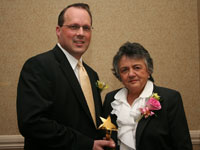
Gary King, left, with Chief Justice Abrahamson.
April 1, 2009 – Although the award recognizes his individual efforts to start a legal clinic in Chippewa County, King said there would be no clinic if not for the other lawyers who have volunteered to staff the clinic since it opened in January 2000.
“Being recognized as an individual for the clinic work is more than humbling because without all of the other people’s work, there is no way it would run,” King said. ‘When they said they were going to send in a nomination, I said I’d only take it [on behalf of the group].”
Meeting a need
King said that he had worked at a legal clinic in Eau Claire and noticed that many people were traveling from neighboring Chippewa County for assistance. With a State Bar Local Grant of $1,500, King and Lucie McGee, an assistant city attorney for Eau Claire, founded the Chippewa County Bar Association’s Free Legal Clinic. The goal of the clinic was to provide basic legal information to those who cannot afford an attorney.
The clinic draws about 25 people when it is held at the local public library from 6:30 to 8 p.m. on the fourth Wednesday of the month, excluding the dates that conflict with holidays. The Chippewa clinic operates the week following its Eau Claire counterpart to maximize the availability of legal assistance. King estimates that the Chippewa clinic has probably served 2,500 to 3,000 people in its nine years of operation.
King, a solo practitioner in Eau Claire, works at the clinic every month and maintains its records. He is joined by several local lawyers recruited by King to volunteer their time. King greets the public and tries to match their question up with an appropriate attorney.
“Attorney King works to make each individual comfortable with using the clinic’s services,” McGee said. “He is an attentive listener who takes each issue seriously. He provides thoughtful answers to legal questions that cover numerous areas of law. He shows respect for each individual who comes through the door and needs help.”
Each meeting with a lawyer is about 10 or 15 minutes, King said. Questions cover a variety of areas such as family law, landlord/tenant, small claims, personal injury, estate planning, and criminal/traffic.
Consultations are brief and may be limited to finding a statute applicable to a problem or an appropriate agency, but King said a little assistance can help a lot. “Attorneys have a lot of basic information that they take for granted, but that the general public doesn’t know,” King said. “For someone in a situation, you can at least help get them started with the legal question they have.”
“Sometimes we don’t know the answer to the question,” King continued. “But people appreciate having the opportunity to sit with a lawyer who will listen to a question.”
An ongoing commitment
King marked the 100th clinic last October and there is no reason the clinic shouldn’t reach its 200th. King said the clinic benefits from positive word-of-mouth and people continue to visit. “If no one showed up or there was no decent feedback, it wouldn’t continue,” he said.
Some of the clinic’s volunteer lawyers move from the area or take new jobs that preclude further work with the clinic, King said. But many lawyers – some who have volunteered from the beginning – continue to carry on, he said.
The sustained interest among lawyers to help is not an accident.
Participating lawyers credit King with ensuring the clinic is as much about creating fellowship within the profession as helping the community. “After the clinic, Gary and the volunteer attorneys generally retire to a local pizza parlor to talk over legal, political, and sports issues,” said volunteer Michael O’Brien of Weld, Riley, Prenn & Ricci, S.C. in Eau Claire. “I think that this effort of camaraderie is what our profession should be all about.”
